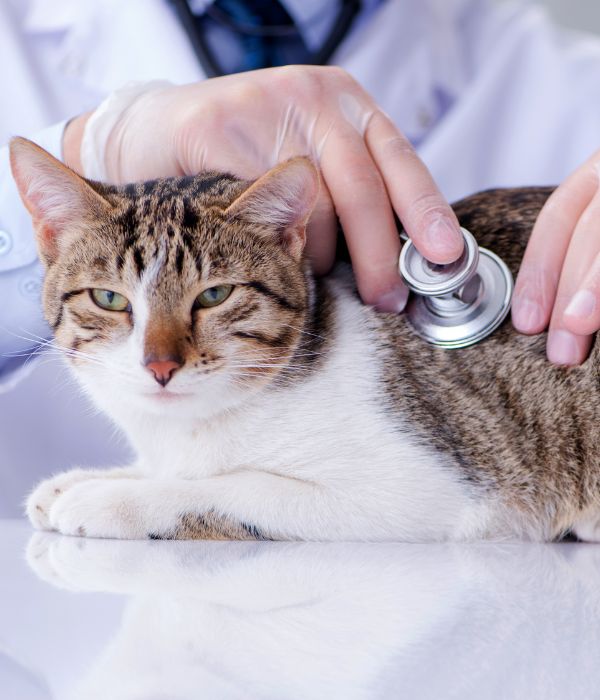Pet Wellness Exams
Regular pet wellness exams at Knox Pet Clinic in Galesburg, IL, are crucial for maintaining your pet’s overall health and detecting potential issues early. Our experienced veterinary team provides comprehensive wellness exams tailored to meet the specific needs of your pet.
What is a Pet Wellness Exam?
A pet wellness exam is a routine check-up that helps monitor your pet’s health and prevent potential health problems. These exams are an essential part of responsible pet ownership, allowing veterinarians to assess your pet’s physical condition, administer necessary vaccinations, and provide preventive care.
Benefits of Regular Pet Wellness Exams
Regular wellness exams offer numerous benefits, including:
- Early Detection of Health Issues: Identifying problems early can lead to more effective treatment and better outcomes.
- Preventive Care: Keeping up with vaccinations and parasite control protects your pet from common diseases and parasites.
- Monitoring Chronic Conditions: Regular exams help manage chronic health issues, ensuring your pet receives the best possible care.
- Personalized Health Advice: Our veterinarians provide tailored advice on diet, exercise, and overall care based on your pet’s unique needs.
What to Expect During a Pet Wellness Exam
During a pet wellness exam at Knox Pet Clinic, our veterinary team will conduct a thorough evaluation of your pet’s health. This includes a physical examination, diagnostic tests, and discussions about your pet’s lifestyle and care routine.
Physical Examination
The physical examination is a key component of the wellness exam. The veterinarian will check your pet’s vital signs, including temperature, heart rate, and respiration rate. They will also examine your pet’s:
- Eyes: Checking for clarity, discharge, and signs of infection or other issues.
- Ears: Inspecting for infections, mites, and other abnormalities.
- Mouth and Teeth: Assessing dental health, including checking for tartar, plaque, and gum disease.
- Skin and Coat: Evaluating for signs of allergies, parasites, and skin conditions.
- Abdomen: Palpating for any abnormalities in the organs.
- Musculoskeletal System: Checking for joint, muscle, and bone health.
Diagnostic Tests
Depending on your pet’s age, health, and medical history, the veterinarian may recommend diagnostic tests such as:
- Blood Tests: To check for infections, anemia, and organ function.
- Urinalysis: To assess kidney function and detect urinary tract infections.
- Fecal Exam: To check for intestinal parasites.
- Heartworm Test: Especially important for dogs, to detect heartworm infection.
Vaccinations and Preventive Care
Keeping your pet up-to-date on vaccinations is crucial for preventing common diseases. During the wellness exam, the veterinarian will review your pet’s vaccination history and administer any necessary vaccines. Preventive care may also include:
- Parasite Control: Recommendations for flea, tick, and heartworm prevention.
- Dental Care: Advice on maintaining your pet’s dental health.
- Nutritional Counseling: Guidance on proper diet and nutrition.
FAQ For Pet Wellness Exam
What is a Wellness Examination?
A wellness examination is a routine assessment of healthy pets to ensure they are maintaining good health.
How often should my dog or cat have a wellness examination?
Your puppy or kitten will need to be seen monthly starting at 6-8 weeks of age. This monthly visit includes vaccinations and a physical assessment to ensure your pet is growing and developing well. These visits are also a great time to talk about any questions or concerns you may have about your new pet.
Your adult pet should have a wellness examination once a year. As your pet ages, we recommend a semiannual examination especially during the senior stage. These recommendations are a generalization, and your veterinarian may suggest an alternate schedule based on your pet’s health, breed and lifestyle. Of course, anytime your pet seems to be ill, a physical examination should be completed.
What will my veterinarian check during a wellness examination?
During a wellness examination, your pet will get a physical exam and you will discuss your pet’s attitude and habits at home. We will also address any questions you may have about your pet’s well-being.
Is there anything I need to do to prepare my dog for a wellness examination?
You may be asked to bring a urine or stool sample with you or to have your pet fast prior to coming in for testing. Please be sure to ask about this when scheduling your appointment. Also, make sure you know what your pet’s diet consists of, including brand, type, amounts fed, and treats. Please bring along a list of all medications or supplements your pet is on as well.
If you would like to schedule an appointment for your pet’s wellness exam, call us at 309-343-6156. You can also book an appointment online.
What does my veterinarian check during a physical examination?
During the physical examination, your pet will be looked at from the nose all the way to the tip of the tail and everything in between.
This includes:
- Eyes– are they clear or cloudy? Any discharge or growths?
- Mouth– color and condition of gums, the health of teeth, any growths or bad odor?
- Nose– free from discharge and growths
- Ears– any wax or discharge, odor, or growths
- Body condition– are they too thin or overweight
- Hair and skin– check texture, lesions, or for any hair loss
They will listen to:
- Heart – rate, arrhythmias, murmurs
- Lungs – rate and sound
They will palpitate the:
- Legs– pain, stiffness, masses
- Abdomen– kidney, liver, spleen, growths, pain
- Pulse– rate and strength
- Lymph Nodes– enlargement
What else might be checked during a wellness examination?
- Urine– infection, inflammation, the presence of blood
- Feces– intestinal parasites such as hookworms, roundworms, and tapeworms
- Blood– A general health panel will take a look at internal organ function such as the liver and kidneys and a complete blood cell count will look at white and red blood cell counts as well as platelets and can check for any indication of infection

